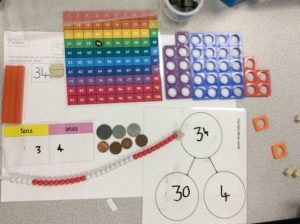Mathematics here at Morpeth All Saints…

Mathematics equips pupils with the uniquely powerful set of tools to understand and change the world. These tools include logical reasoning, problem solving skills and the ability to think in abstract ways.
Mathematics is important in everyday life. It is integral to all aspects of life and with this in mind at Morpeth All Saints First School we endeavour to ensure that children develop a positive and enthusiastic attitude towards mathematics that will stay with them throughout their lives.
It is vital that a positive attitude towards mathematics is encouraged amongst all of our pupils in order to foster confidence and achievement in a skill that is essential in our society. At Morpeth All Saints we use the new National Curriculum for Mathematics as the basis of our mathematics programme. We are committed to ensuring that all pupils achieve mastery in the key concepts of mathematics, appropriate for their age group, in order that they make genuine progress and avoid gaps in their understanding which could become barriers to learning as they move through education. Pupils who grasp concepts rapidly should be challenged through being offered rich and sophisticated problems before any acceleration through new content. Those who are not sufficiently fluent with earlier material should consolidate their understanding, including through additional practice, before moving on.
Assessment for Learning, with an emphasis on fluency, reasoning and problem solving and the development of mathematical vocabulary and thinking combined with a rigorous approach to the development of teacher subject knowledge are therefore essential components of Morpeth All Saints approach to this subject.
Aims
We aim to provide the pupils with a mathematics curriculum and high quality teaching to produce individuals who are numerate, creative, independent, inquisitive, enquiring and confident. We also aim to provide a stimulating environment and adequate resources so that pupils can develop their mathematical skills to the full.
Our pupils should:
- Have a well-developed sense of the size of a number and where it fits into the number system.
- Know by heart age appropriate number facts such as number bonds, multiplication tables, doubles and halves.
- Use what they know by heart to figure out numbers mentally.
- Calculate accurately and efficiently, both mentally and in writing and paper, drawing on a range of calculation strategies.
- Recognise when it is appropriate to use a calculator and be able to do so effectively.
- Make sense of number problems, including non-routine/’real’ problems and identify the operations needed to solve them.
- Explain their methods and reasoning, using correct mathematical terms.
- Judge whether their answers are reasonable and have strategies for checking them where necessary.
- Suggest suitable units for measuring and make sensible estimates of measurements.
- Explain and make predictions from the numbers in graphs, diagrams, charts and tables.
- Develop spatial awareness and an understanding of the properties of 2D and 3D shapes.
Intent:
At Morpeth All Saints we are strong believers that mathematics forms an important part of all children’s’ development. This starts from an early age and carries on throughout their schooling. We intend on delivering a well-planned curriculum that allows each child to explore maths in a creative and engaging way. We will give each child the chance to believe that they are mathematicians, give each child the underrating that maths underpins all aspects of our daily lives and achieve to the best of their potential. The children will make connections and develop fluency, mathematical reasoning and problem solving skills through quality of teaching, and learning opportunities, in line with the expectations in the National Curriculum 2014.
Implementation:
At MAS, we follow the National Curriculum and use White Rose Schemes of Work as a guide to support teachers with their teaching, planning and assessment. The calculation policy is used within school to ensure a consistent approach to teaching the four operations across all year groups, alongside the vocabulary progression document to ensure consistency for all year groups.
A starting activity based on the non-negotiables in each lesson, ensures that fluency and key skills are reviewed and embedded daily.
At the start of each new topic, key vocabulary is introduced and displayed to the children within the classroom and is referred to throughout the block being taught. Strategies are displayed to aid children with their work and increase independency. Concrete resources are used to encourage children to be able to manipulate and embed the topic taught, before moving on to pictorial and abstract methods.
Children move through the different stages of their learning at their own pace within the year group and are given opportunities that are challenging at all points, with opportunities to use more than one skill to answer the reasoning and problems solving activities to develop their mathematical thinking.
Children with additional needs are included in whole class lessons when appropriate, and teachers provide extra modelling, scaffolding and relevant support as necessary. For those children who are working outside of the year group curriculum, individual learning activities are provided to ensure their progress.
Marking and feedback is given on children’s learning in line with our marking policy. Formative assessment within every lesson, helps teachers to identify the children who need more support to achieve the learning intention, and who are ready for greater stretch and challenge through planned questioning or additional activities. Clear analysis of assessments that the children complete is undertaken and fed into future planning.
Impact:
As a result of our Maths teaching at MAS you will see enthusiastic children who are challenged in their mathematical thinking. The children will be confident in making links between topics and can apply their knowledge with the understanding that perseverance and resilience will be needed.
Learning is monitored and assessed to ensure that all children are making good progress and reaching the best of their ability and are achieving the objectives set out for their year group. Children will demonstrate quick recall of facts (including times tables facts) and will confidently use multiple ways of completing a task, using mathematical language correctly.

